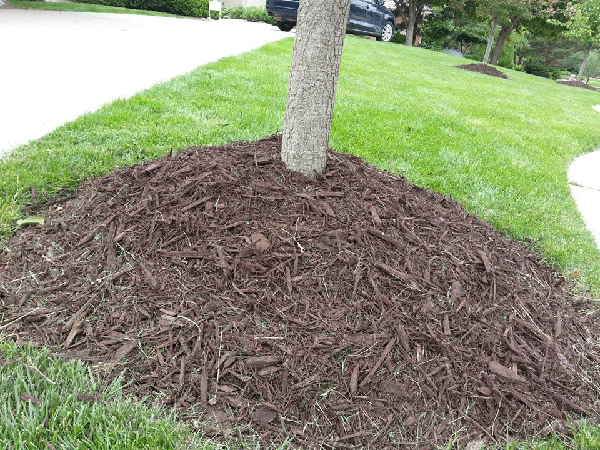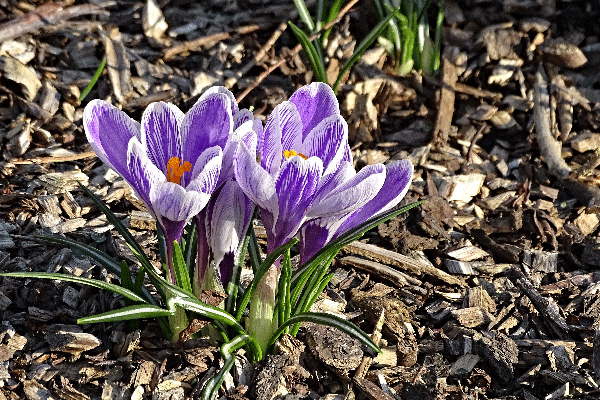When I think about spring, I always think about planting. It is fun, stress relieving, and rewarding for me to get my hands dirty and plant some new plants or change what I have in my garden. One thing to always remember when planting a garden or cleaning up an existing one is the mulch.
Mulch is a great benefit to our plants. Mulch helps keep the soil cold for our plants through the winter months, and in summer protects them from lawnmower blight, holds moisture near the plants, and reduces weed competition.
 No mulch volcanoes!
No mulch volcanoes!Winter Protection
In the winter months, mulch is helpful to protect our plants. However, mulch does not necessarily keep the roots of the plants warm, it keeps soil temperatures from constantly freezing and thawing. In the winter months, freezing and thawing of the soil can push the plant out of the soil in a condition called frost heaving. This exposes the plant's crown to winter temperatures and can kill it. We often add extra mulch in fall to help protect our plants.
Some plants, like strawberries, are heavily mulched in fall. This protects the tiny immature flower buds, which already started to form in fall, from very cold winter temperatures. It is important to wait to uncover them in spring, until freezing temperatures have past. If the plants start to green up under the mulch or pop through the mulch you can pull the mulch back away from the plants, leaving it nearby to cover the plants back up if freezing temperatures are predicted again. It is best to wait until early May to fully uncover those plants, once the threat of frost has passed for the year.
Physical Protection
Mulch also helps protect our plants from a condition we refer to as ‘lawnmower blight’. Lawnmower blight often occurs to our trees and shrubs growing right in the turf with no mulch around them, when the mower or weed trimmer gets too close to plants damaging the trunk or branches of the shrub. This damage disrupts the flow of water and nutrients through the tree. One damaging incident usually does not kill the tree, but it opens up an avenue for wood rot to enter. Repeated damage may kill the tree. Having the mulch ring will keep the lawn equipment back away from the tree.
Preserves Soil Moisture
Mulch is also great for our plants during the spring and summer months to help keep moisture near the plant and reduce competition from other plants. Wood chips hold moisture in the soil which can be used by the plants. A layer of mulch reduces competition for water, nutrients, and space from other plants growing nearby. Turf is included as a competition for our landscape plants. It is best for the overall health of our desired plants to keep the competition limited around the roots.
How Much Mulch?
Mulch needs to be applied correctly to help the plants, if applied incorrectly it can damage them. A 2-3 inch mulch layer is recommended. Too much mulch prevents oxygen from reaching the roots and the roots may begin to grow into the mulch, instead of in the soil. If the mulch is applied too shallowly, weeds will come up through it.
Avoid mulch volcanoes! They can cause damage to woody plants and create a haven for bark-eating voles. Coarse textured mulches are better for plants than fine textured mulches which can become compacted and reduce soil oxygen.
Which Mulch to Use?
Organic mulches are preferred over inorganic mulches. Organic mulches include wood chips, straw, leaves, and untreated grass clippings.
Inorganic mulches such as rock or crushed rubber are not beneficial to plants. Inorganic mulches, and the landscape fabric applied beneath them, inhibit soil oxygen penetration. They also hold heat and reflect that heat onto plants causing heat stress and increasing drought effects.

